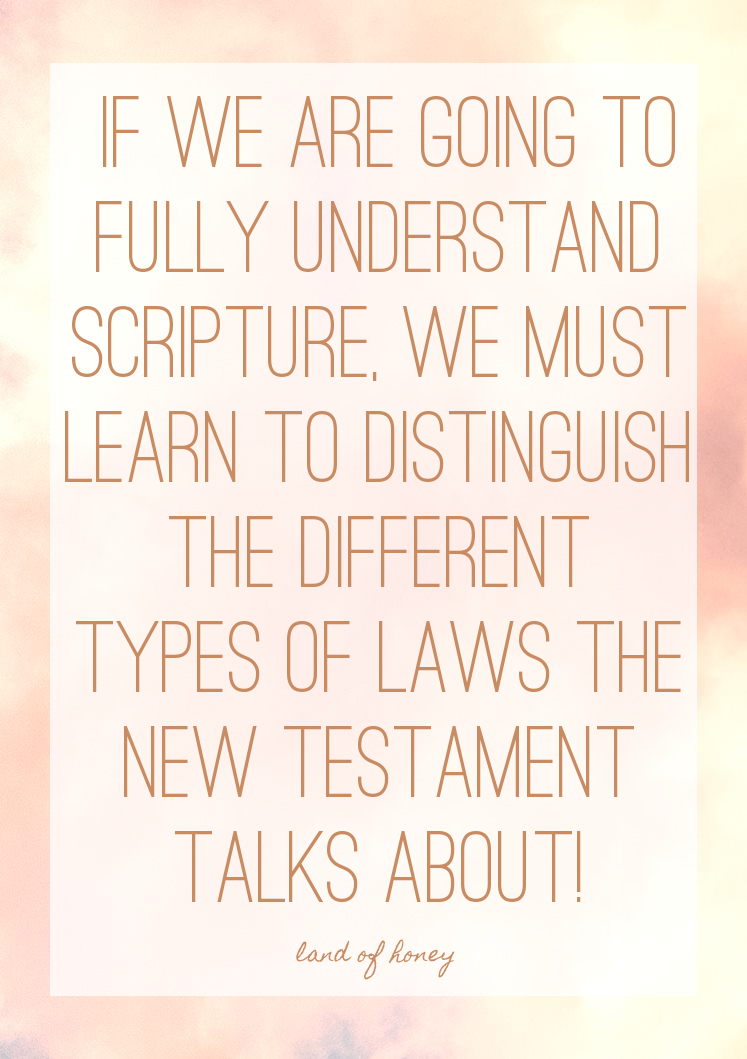What comes to mind when you think of Biblical law? That phrase used to sound foreboding to me. I pictured people getting stoned for any little thing they did wrong. I thought it was insanely nitpicky things that no one could ever do, and a lot of animal sacrifice.
With this attitude, Biblical law scared me. I eagerly accepted that the Messiah came to do away with it so I wouldn't have this terrible threat looming over me! Any time an "Old Testament" concept would come up, I would write it off, thinking it had been done away with. I would hear of things like Sabbath keeping and assume those people were also sacrificing goats or wanted to stone people who did wrong.
But eventually, I read through all of the Old Testament and saw for myself what Biblical law actually consists of. When I started actually reading Scripture I realized it really isn't so bad. It's mostly pretty reasonable, with obvious benefits.
Part of the problem is we mix Biblical law in with the instructions for the Levitical priesthood. I don't want to undermine that the Levitical temple service was legitimate and served a valuable purpose - it did. But Scripture tells us that the Messiah's priesthood is of the order of Melchizedek, not Levi. We do not have to worry about offering up animals when we sin. Praise YHWH! Because the Messiah's death was once and for all, we are not to take up animal sacrifice or other Levitical customs, but that doesn't negate Biblical law.
Levitical law and Biblical law are not the same thing. Plenty of Biblical instructions were given before the Levitical priesthood was instated. Men and women starting with Adam and Eve were given commands from the Creator. Noah and his family knew the difference between clean and unclean animals, Abraham and Sarah were instructed in how to serve YHWH, and the ten commandments were given before Levitical law was a thing. It is imperative to recognize the difference between Biblical law and Levitical law.
Biblical law mostly consists of the following categories:
-instructions about worshipping YHWH
-commands for treating others
-instructions for Biblical holidays, including the Sabbath
-animals we are commanded not to eat
-instructions for loans and business conduct
-instructions for sexual conduct
The more I studied about these commandments, the more I realized that most of these are pretty practical, and help us to live in a way that invites peace and contentment, as well as the Holy Spirit into our lives. Here is the Living God, handing out life hacks if you will. Let's examine these categories in a bit more depth.
Basics of Biblical law:
We are commanded to worship YHWH within certain parameters.
-YHWH is to be our only god. (Exodus 20:3)
-We should love YHWH with all of our heart, mind, and strength. (Deuteronomy 6:4)
-We should remember the name of YHWH and not bring it to vanity. (Exodus 20:7)
-We are not to test YHWH's promises and warnings. (Deuteronomy 6:16)
-We are not to make images or idols. (Exodus 20:4)
-We are not to practice soothsaying, enchanting, sorcery, or necromancy. (Deuteronomy 18:10-11)
We are given commands for how we treat others.
-Love your neighbor as yourself. (Leviticus 19:18)
-We are to honor our parents. (Exodus 20:12)
-Lost property must be returned to its owner. (Exodus 23:4)
-We are to love converts to the faith. (Deuteronomy 10:19)
-We are not to steal. (Exodus 20:15)
-We are not to covet our neighbor's possessions. (Exodus 20:17)
-We are not to deny charity to the poor. (Deuteronomy 15:7)
We are commanded to observe YHWH's set apart times.
-We are to set apart the Sabbath day and rest and worship YHWH on it. (Exodus 20:8-11)
-We are to observe Passover, Unleavened Bread, First Fruits, Shavuot, the Feast of Trumpets, Yom Kippur, and the Feast of Tabernacles. There are a few more instructions for each specific holiday. (Leviticus 23)
We are commanded not to eat certain animals.
-Animals that don't have hooves and chew the cud are forbidden. (Leviticus 11:4)
-Fish must have fins and scales to be permissible. (Leviticus 11:9)
-We are not to eat blood. (Deuteronomy 12:23)
Loans and business conduct.
-We are to lend money to the poor and foreigners without interest. (Exodus 22:24, Deuteronomy 23:21)
-Workers should be paid on time. (Deuteronomy 24:15)
-Accurate weights and measures need to be used. (Leviticus 19:36)
-We are not to demand payment from a debtor known to be unable to pay. (Exodus 22:24)
-We should not fraudulently move property boundaries. (Deuteronomy 19:14)
Instructions regarding sexuality.
-Physical intimacy is to be within a marriage covenant. (Genesis 2:24)
-Adultery is forbidden. (Exodus 20:14)
-Homosexuality is forbidden. (Leviticus 18:22)
-Divorce must be formalized with a written document. (Numbers 5:15-27)
Do these things sound like something the Messiah wanted to do away with? Do we really think YHWH sent his son to liberate us from not having other gods besides him? Was his goal to free us from the obligations to honor our parents and to not commit adultery? Would it be a positive if we started denying charity to the poor, started using dishonest weights and measures in our businesses, made robbery okay, and started practicing necromancy?
If we are going to understand the New Testament we need to know that it never speaks against these things! The Messiah never said anything against Biblical law. You can search the entirety of the New Testament and you will not find him violating these commandments, suggesting others do so, or saying negative things about them. He always followed and upheld these things.
The same goes for the the disciples and authors of the New Testament. No one was speaking or acting against Biblical law. There are many passages of the Bible that seem like this is what's happening, but in those cases they are either talking about the Levitical priesthood ending or saying that believers don't need to abide by Jewish or manmade laws. While the Messiah frequently told his followers to set aside manmade traditions, he never taught anyone to disregard Biblical law.
Please note that this post goes over the basics of Biblical law, and is not intended to be an enumeration of every single law in the Bible.
Related posts:
Comparing the Melchizedek and Levitical Priesthoods
The Three Types of Laws in the Bible
Commandments or Traditions - Understanding the New Testament
5.jpg)
7.jpg)
.jpg)
.jpg)



























